



by Audra Starkey | Jul 7, 2015 | Mindset
I have to admit, I’m a huge tennis fan. I love watching the tennis, so much so that I try and get to the Australian Open in Melbourne every single year. I’ve also been lucky enough to attend the French Open, as well as being in New York during all of the buzz and...
by Audra Starkey | Jan 21, 2014 | Movement
Is working shift work harder than playing a game of tennis? Probably, but not if you asked the players currently competing in the Australian Open in Melbourne right now. With a week of record temperatures (4 days of over 40 degrees), even the world’s best are...